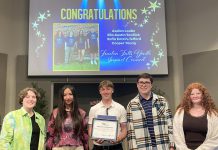
The lottery results are in for the performing artists who will be on the bill for the 2025 Nogojiwanong Indigenous Fringe Festival (NIFF), considered to be the only Indigenous fringe festival in the world.
NIFF organizers have announced the artists who will take the stage for the fringe festival, which runs from June 19 to 22. Both new and returning artists will gather for performances in NIFF’s new East City home, the Peterborough Theatre Guild, which is located at 364 Rogers St. in Peterborough.
Below are the artists for this year’s festival, with descriptions about each performance from the NIFF website.
Juicebox Theatre (Winnipeg) with their play “Mutt”
Mutt is a show about how we treat and view the world around us in this age, and compares it to old ways of life and thoughts on combination.
Centre for Indigenous Theatre (Toronto) with “Whistling Pine (A Dark Comedy)” by Chris Mejaki
CJ is a young Indigenous man dealing drugs in small-town Ontario. The trajectory of his life takes a dramatic and comedic turn when he’s arrested, incarcerated, and mysteriously contacted by his ancestral spiritual guides. Whistling Pine takes CJ on a spiritual journey of awakening and personal reconciliation.
John-Paul Chalykoff (Sault Ste. Marie) and his puppet friends with “Songs from Gichi-Gamiing”
Coming from Gichi-Gamiing (Lake Superior), Baabii, a furry blue creature from an island on the lake, will be visiting with some of his friends. They will be sharing songs and stories bilingually in Anishinaabemowin and English. There will be time for a Q&A at the end.
Oshkagoojin Theatre Projects (Winnipeg) with “Niin Anihinaabekwe”
Join Bae (short for Ah-nish-eh-nah-Bae) on a brief adventure in her daily urban life. Bae, an Ojibwe woman and “Contrary” (a ceremonial role as a mirror and teacher to society), navigates her day and suddenly finds herself stranded.
This piece reflects the predicaments urban Indigenous folks face, using humour and clownery to grapple with lack of access to traditional territories, knowledgem and connections to land. It deals with themes such as how resilient urban Indigenous folks are and explores how easily blood memory is reignited through reconnection to the land, honouring reciprocity, inherited traditional knowledge, food security and land stewardship.
Indian Way Theatre (Akwesasne) with “My Good Friend Jay”
In short, this play is about Akwesasne. This play is about childhood. This play is about smuggling. This play is about Indigenous sovereignty. This play is about family. This play is about the Mohawks of Akwesasne.
We can focus on the physical and the cultural. How our traditions got tangled in this web of politics and ideologies, which only caused our people to suffer. How we persist and continue. How close and personal the land is to our very livelihood, how people don’t understand and how we don’t really care if you can’t understand. How we say we’re not going to coddle you after everything is done. Not after all the patience we’ve spent already.
Akwesasne is cut into four separate jurisdictions: one district in Ontario, two in Quebec, and one in New York State. To people who are not aware or used to this fact, it’s fascinating. It’s intricate. It begs more explanation and more questions. To us it’s an inconvenient and, most of the time, dull reality. Until we decide it isn’t.
3 Soul Goddess with their drama “Postcards from Colonization”
Three women from different backgrounds explore their relationship to colonization and each other.
Subi-Baba-Yi Dilalan from Cameroon with music and stories in “People of the Forest” (to be confirmed)
People of the Forest is a dance performance that honours the rich and living traditions of the Pygmy communities of Cameroon. Through powerful, symbolic movement, the show invites audiences on a sensory journey deep into the heart of the equatorial rainforest.
NIFF general manager Lee Bolton shared her thoughts with kawarthaNOW on the lottery results for the performing artists.
“We are really happy that the Centre for Indigenous Theatre in Toronto continues to participate in NIFF, offering high-quality productions of exciting Indigenous plays every year,” Bolton said. “It is also really interesting to see that this year we are very much a theatre festival, with solo and collective plays making up most of the performances.”
Bolton noted that theatrical performances made up the majority of applications to NIFF this year, which is appropriate for the festival’s new home at the Peterborough Theatre Guild.
“Peterborough theatre-goers have demonstrated their appetite for all kinds of plays over the years, filling spaces like the Guild and (The Theatre on King) and 4th Line (Theatre), and NIFF offers a veritable banquet of possibilities,” she said.
Following four years at Trent University’s Peterborough campus, NIFF announced it would be moving in 2025 to East City. The venue, a former church now known as the Guild Hall, has played host to a wide variety of performances since 1965.
The 2025 instalment of NIFF will also include Indigenous visual artists for the first time. With the Guild location, NIFF will have access to a space that is regularly used for art exhibits. Visual artists, who will also be chosen by lottery, are invited to apply between now and May 10.
More information about the shows and artists is on NIFF’s website at www.indigenousfringefest.ca. A full schedule for the festival, including special events and vendors, will be available in early May. Ticket sales will start in late May.



























